 minimal-mistakes
minimal-mistakes
:triangular_ruler: Jekyll theme for building a personal site, blog, project documentation, or portfolio.
Top Related Projects
:globe_with_meridians: Jekyll is a blog-aware static site generator in Ruby
A content-first, sliding sidebar theme for Jekyll.
Build a Jekyll blog in minutes, without touching the command line.
✨ Build a beautiful and simple website in literally minutes. Demo at https://beautifuljekyll.com
Github Pages template based upon HTML and Markdown for personal, portfolio-based websites.
Minimal is a Jekyll theme for GitHub Pages
Quick Overview
Minimal Mistakes is a flexible Jekyll theme for building personal sites, blogs, and portfolios. It's designed to be minimal in style but feature-rich, offering a wide range of customization options and layouts to suit various needs.
Pros
- Highly customizable with numerous configuration options
- Responsive design that works well on various devices and screen sizes
- Extensive documentation and active community support
- Built-in SEO optimization and social sharing features
Cons
- Learning curve for users new to Jekyll or static site generators
- Some advanced customizations may require knowledge of HTML, CSS, and Liquid templating
- Limited built-in e-commerce capabilities compared to dedicated e-commerce platforms
Getting Started
-
Install Jekyll and Bundler:
gem install jekyll bundler -
Create a new Jekyll site:
jekyll new my-site cd my-site -
Add this line to your
Gemfile:gem "minimal-mistakes-jekyll" -
Add this line to your
_config.yml:theme: minimal-mistakes-jekyll -
Run
bundle installto install the theme and its dependencies. -
Start your Jekyll server:
bundle exec jekyll serve -
Open your browser and navigate to
http://localhost:4000to see your new Minimal Mistakes-themed site.
Competitor Comparisons
:globe_with_meridians: Jekyll is a blog-aware static site generator in Ruby
Pros of Jekyll
- More flexible and customizable as a static site generator
- Larger ecosystem with extensive plugins and themes
- Better suited for complex site structures and large-scale projects
Cons of Jekyll
- Steeper learning curve for beginners
- Requires more setup and configuration
- Slower build times for large sites compared to pre-built themes
Code Comparison
Jekyll (basic site structure):
.
├── _config.yml
├── _data
├── _drafts
├── _includes
├── _layouts
└── _posts
Minimal Mistakes (theme structure):
.
├── _data
├── _includes
├── _layouts
├── _sass
├── assets
└── _config.yml
Minimal Mistakes is a Jekyll theme that provides a pre-designed, responsive layout for Jekyll-based websites. It offers a quicker setup process and is ideal for personal blogs or portfolios. Jekyll, on the other hand, is the core static site generator that provides more flexibility but requires more initial configuration.
While Minimal Mistakes focuses on providing a polished, ready-to-use theme, Jekyll allows for greater customization and is better suited for larger, more complex websites. The choice between the two depends on the project's requirements, the developer's experience level, and the desired level of customization.
A content-first, sliding sidebar theme for Jekyll.
Pros of Lanyon
- Simpler and more minimalist design, easier for beginners
- Faster loading times due to less complex structure
- Sidebar toggle feature for improved mobile experience
Cons of Lanyon
- Fewer built-in features and customization options
- Less active development and updates
- Limited theme variations compared to Minimal Mistakes
Code Comparison
Lanyon (main.css):
.sidebar {
position: fixed;
top: 0;
bottom: 0;
left: -14rem;
width: 14rem;
visibility: hidden;
overflow-y: auto;
font-family: "PT Sans", Helvetica, Arial, sans-serif;
font-size: .875rem;
color: rgba(255,255,255,.6);
background-color: #202020;
-webkit-transition: all .3s ease-in-out;
transition: all .3s ease-in-out;
}
Minimal Mistakes (_sidebar.scss):
.sidebar {
@include clearfix();
@include breakpoint(max-width $large) {
/* fix z-index order of follow links */
position: relative;
z-index: 10;
-webkit-transform: translate3d(0, 0, 0);
transform: translate3d(0, 0, 0);
}
@include breakpoint($large) {
float: left;
width: calc(#{$right-sidebar-width-narrow} - 1em);
opacity: 0.75;
-webkit-transition: opacity 0.2s ease-in-out;
transition: opacity 0.2s ease-in-out;
&:hover {
opacity: 1;
}
&.sticky {
overflow-y: auto;
/* calculate height of nav list
viewport height - nav height - masthead x-padding
*/
max-height: calc(100vh - #{$nav-height} - 2em);
}
}
}
Build a Jekyll blog in minutes, without touching the command line.
Pros of jekyll-now
- Simpler setup process, ideal for beginners
- Faster initial deployment with fewer customization options
- Includes a basic blog structure out of the box
Cons of jekyll-now
- Limited theme customization options
- Fewer features and layout variations
- Less active development and community support
Code Comparison
minimal-mistakes:
# _config.yml
minimal_mistakes_skin: "default"
search: true
paginate: 5
jekyll-now:
# _config.yml
name: Your Name
description: Web Developer from Somewhere
avatar: https://raw.githubusercontent.com/barryclark/jekyll-now/master/images/jekyll-logo.png
minimal-mistakes offers more configuration options and features, while jekyll-now focuses on simplicity with fewer customization choices.
minimal-mistakes provides a more comprehensive theme structure with multiple layout options, whereas jekyll-now offers a basic blog setup that's easier to get started with but less flexible for complex sites.
In terms of community engagement, minimal-mistakes has more frequent updates, a larger user base, and more extensive documentation, making it a better choice for long-term projects that may require ongoing support and feature additions.
✨ Build a beautiful and simple website in literally minutes. Demo at https://beautifuljekyll.com
Pros of Beautiful Jekyll
- Simpler setup and configuration process
- Built-in support for Google Analytics and Disqus comments
- More beginner-friendly with less customization options
Cons of Beautiful Jekyll
- Less flexible and fewer customization options
- Smaller community and fewer themes available
- Less frequent updates and maintenance
Code Comparison
Beautiful Jekyll configuration:
title: My Website
author: John Doe
navbar-links:
About Me: "aboutme"
Resources:
- Beautiful Jekyll: "https://beautifuljekyll.com"
- Learn markdown: "https://www.markdowntutorial.com/"
Minimal Mistakes configuration:
minimal_mistakes_skin: "default"
locale: "en-US"
title: My Website
name: "John Doe"
description: "Personal blog and portfolio"
url: "https://example.com"
Both repositories provide Jekyll themes for creating static websites and blogs. Beautiful Jekyll focuses on simplicity and ease of use, making it ideal for beginners or those who prefer a straightforward setup. Minimal Mistakes offers more advanced features and customization options, catering to users who want greater control over their site's appearance and functionality. The code comparison shows that Beautiful Jekyll's configuration is more concise, while Minimal Mistakes provides more detailed options for customization.
Github Pages template based upon HTML and Markdown for personal, portfolio-based websites.
Pros of academicpages.github.io
- Specifically designed for academic websites and portfolios
- Includes pre-built sections for publications, talks, and teaching
- Easier setup for academic users with less customization required
Cons of academicpages.github.io
- Less flexible for non-academic use cases
- Fewer theme options and customization possibilities
- Less frequent updates and smaller community compared to minimal-mistakes
Code Comparison
academicpages.github.io:
# Site Settings
locale: "en-US"
title: "Your Name / Site Title"
title_separator: "-"
name: "Your Name"
description: "academic website"
minimal-mistakes:
# Site Settings
locale: "en-US"
title: "Site Title"
subtitle: "Development Test Site"
name: "Your Name"
description: "Minimal Mistakes theme test"
Both repositories use similar YAML configuration for basic site settings, but academicpages.github.io includes more academic-specific options by default.
Minimal is a Jekyll theme for GitHub Pages
Pros of Minimal
- Simpler and more lightweight, ideal for basic GitHub Pages sites
- Easier to set up and customize for beginners
- Faster loading times due to minimal design and features
Cons of Minimal
- Limited functionality and customization options
- Fewer built-in features and layout options
- Less active development and community support
Code Comparison
Minimal (layout.html):
<!DOCTYPE html>
<html lang="{{ site.lang | default: "en-US" }}">
<head>
<meta charset="UTF-8">
<meta http-equiv="X-UA-Compatible" content="IE=edge">
<meta name="viewport" content="width=device-width, initial-scale=1">
Minimal Mistakes (_layouts/default.html):
<!doctype html>
<html lang="{{ site.locale | slice: 0,2 | default: "en" }}" class="no-js">
<head>
{% include head.html %}
{% include head/custom.html %}
</head>
Minimal Mistakes offers more modular and customizable layout structure, while Minimal provides a simpler, more straightforward approach. Minimal Mistakes includes separate files for head content, allowing for easier customization and maintenance of complex sites.
Convert  designs to code with AI
designs to code with AI

Introducing Visual Copilot: A new AI model to turn Figma designs to high quality code using your components.
Try Visual CopilotREADME
Minimal Mistakes Jekyll theme
Minimal Mistakes is a flexible two-column Jekyll theme, perfect for building personal sites, blogs, and portfolios. As the name implies, styling is purposely minimalistic to be enhanced and customized by you :smile:.
:sparkles: See what's new in the CHANGELOG.
Note: The theme uses the jekyll-include-cache plugin which will need to be installed in your Gemfile and must be retained in the plugins array of _config.yml. Otherwise you'll encounter Unknown tag 'include_cached' errors at build.

Notable features
- Bundled as a "theme gem" for easier installation/upgrading.
- Compatible with GitHub Pages.
- Support for Jekyll's built-in Sass/SCSS preprocessor.
- Nine different skins (color variations).
- Several responsive layout options (single, archive index, search, splash, and paginated home page).
- Optimized for search engines with support for Twitter Cards and Open Graph data.
- Optional header images, custom sidebars, table of contents, galleries, related posts, breadcrumb links, navigation lists, and more.
- Commenting support (powered by Disqus, Facebook, Google+, Discourse, static-based via Staticman, utterances, and giscus).
- Google Analytics support.
- UI localized text in English (default), Arabic (عربÙ), Brazilian Portuguese (Português brasileiro), Bulgarian, Catalan, Chinese, Czech, Danish, Dutch, Finnish, French (Français), German (Deutsch), Greek, Hebrew, Hindi (हिà¤à¤¦à¥), Hungarian, Indonesian, Irish (Gaeilge), Italian (Italiano), Japanese, Kiswahili, Korean, Malayalam, Myanmar (Burmese), Nepali (Nepalese), Norwegian (Norsk), Persian (ÙارسÛ), Polish, Punjabi (ਪੰà¨à¨¾à¨¬à©), Romanian, Russian, Slovak, Spanish (Español), Swedish, Thai, Turkish (Türkçe), Ukrainian (УкÑаÑнÑÑка) and Vietnamese.
Skins (color variations)
This theme comes in nine different skins (in addition to the default one).
air | contrast | dark |
|---|---|---|
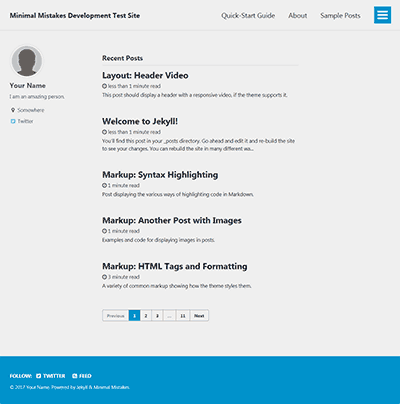 | 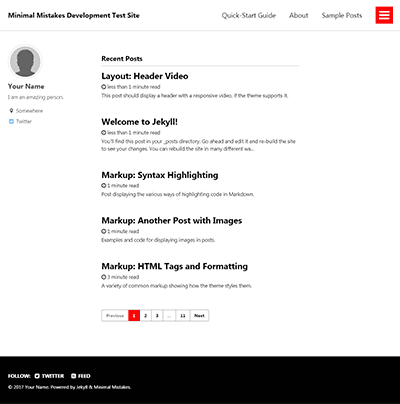 | 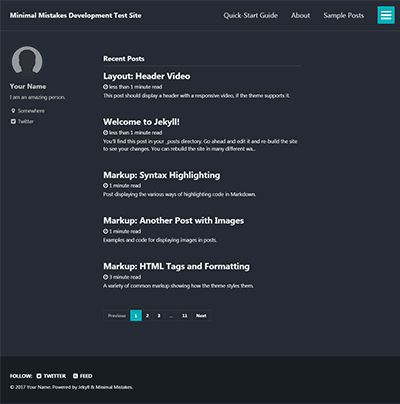 |
dirt | mint | sunrise |
|---|---|---|
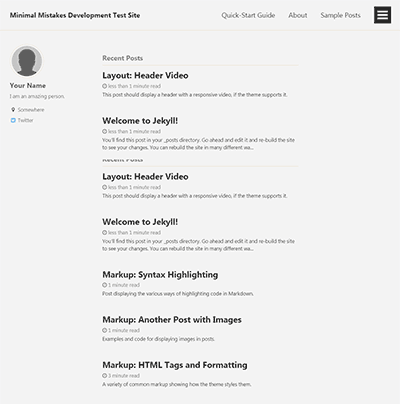 | 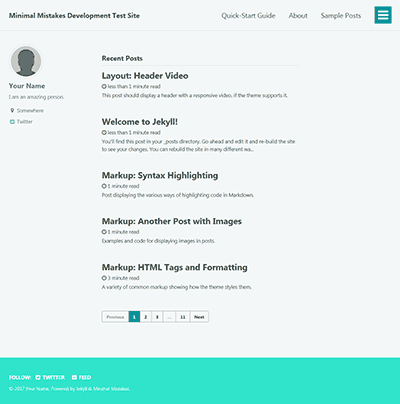 | 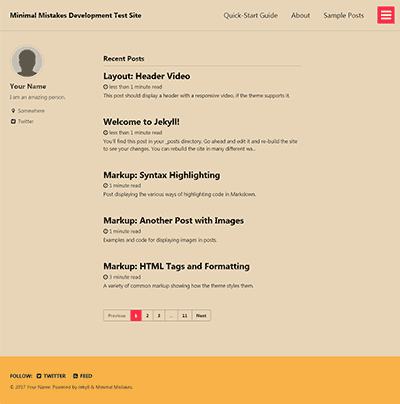 |
aqua | neon | plum |
|---|---|---|
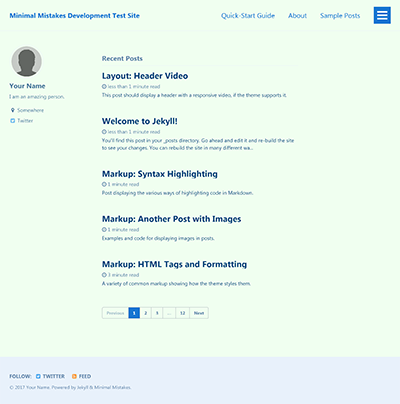 | 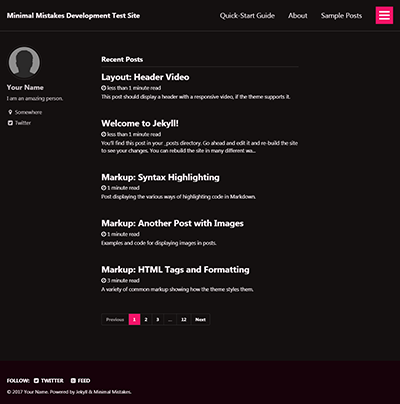 | 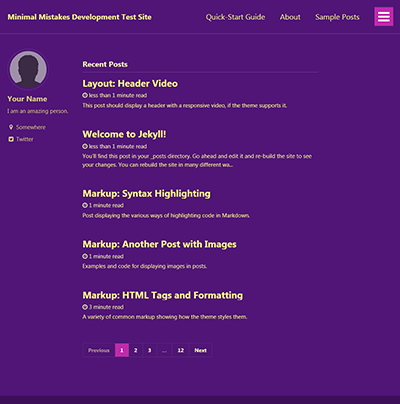 |
Demo pages
| Name | Description |
|---|---|
| Post with Header Image | A post with a large header image. |
| HTML Tags and Formatting Post | A variety of common markup showing how the theme styles them. |
| Syntax Highlighting Post | Post displaying highlighted code. |
| Post with a Gallery | A post showing several images wrapped in <figure> elements. |
| Sample Collection Page | Single page from a collection. |
| Categories Archive | Posts grouped by category. |
| Tags Archive | Posts grouped by tag. |
Additional sample posts are available under posts archive on the demo site. Source files for these (and the entire demo site) can be found in /docs.
Installation
There are three ways to install: as a gem-based theme, as a remote theme (GitHub Pages compatible), or forking/directly copying all of the theme files into your project.
Gem-based method
With Gem-based themes, directories such as the assets, _layouts, _includes, and _sass are stored in the themeâs gem, hidden from your immediate view. Yet all of the necessary directories will be read and processed during Jekyllâs build process.
This allows for easier installation and updating as you don't have to manage any of the theme files. To install:
-
Add the following to your
Gemfile:gem "minimal-mistakes-jekyll" -
Fetch and update bundled gems by running the following Bundler command:
bundle -
Set the
themein your project's Jekyll_config.ymlfile:theme: minimal-mistakes-jekyll
To update the theme run bundle update.
Remote theme method
Remote themes are similar to Gem-based themes, but do not require Gemfile changes or whitelisting making them ideal for sites hosted with GitHub Pages.
To install:
-
Create/replace the contents of your
Gemfilewith the following:source "https://rubygems.org" gem "github-pages", group: :jekyll_plugins gem "jekyll-include-cache", group: :jekyll_plugins -
Add
jekyll-include-cacheto thepluginsarray of your_config.yml. -
Fetch and update bundled gems by running the following Bundler command:
bundle -
Add
remote_theme: "mmistakes/minimal-mistakes@4.27.3"to your_config.ymlfile. Remove any othertheme:orremote_theme:entry.
Looking for an example? Use the Minimal Mistakes remote theme starter for the quickest method of getting a GitHub Pages hosted site up and running. Generate a new repository from the starter, replace sample content with your own, and configure as needed.
Usage
For detailed instructions on how to configure, customize, add/migrate content, and more read the theme's documentation.
Contributing
Found a typo in the documentation or interested in fixing a bug? Then by all means submit an issue or pull request. If this is your first pull request, it may be helpful to read up on the GitHub Flow first.
For help with using the theme or general Jekyll support questions, please use the Jekyll Talk forums.
Pull Requests
When submitting a pull request:
- Clone the repo.
- Create a branch off of
masterand give it a meaningful name (e.g.my-awesome-new-feature). - Open a pull request on GitHub and describe the feature or fix.
Theme documentation and demo pages can be found in the /docs if submitting improvements, typo corrections, etc.
Development
To set up your environment to develop this theme, run bundle install.
To test the theme, run bundle exec rake preview and open your browser at http://localhost:4000/test/. This starts a Jekyll server using content in the test/ directory. As modifications are made to the theme and test site, it will regenerate and you should see the changes in the browser after a refresh.
Credits
Creator
Michael Rose
Icons + Demo Images:
- The Noun Project - Garrett Knoll, Arthur Shlain, and tracy tam
- Font Awesome
- Unsplash
Other:
- Jekyll
- jQuery
- Susy
- Breakpoint
- Magnific Popup
- FitVids.JS
- GreedyNav.js
- Smooth Scroll
- Gumshoe
- jQuery throttle / debounce
- Lunr
- Clipboard.js
License
The MIT License (MIT)
Copyright (c) 2013-2024 Michael Rose and contributors
Permission is hereby granted, free of charge, to any person obtaining a copy of this software and associated documentation files (the "Software"), to deal in the Software without restriction, including without limitation the rights to use, copy, modify, merge, publish, distribute, sublicense, and/or sell copies of the Software, and to permit persons to whom the Software is furnished to do so, subject to the following conditions:
The above copyright notice and this permission notice shall be included in all copies or substantial portions of the Software.
THE SOFTWARE IS PROVIDED "AS IS", WITHOUT WARRANTY OF ANY KIND, EXPRESS OR IMPLIED, INCLUDING BUT NOT LIMITED TO THE WARRANTIES OF MERCHANTABILITY, FITNESS FOR A PARTICULAR PURPOSE AND NONINFRINGEMENT. IN NO EVENT SHALL THE AUTHORS OR COPYRIGHT HOLDERS BE LIABLE FOR ANY CLAIM, DAMAGES OR OTHER LIABILITY, WHETHER IN AN ACTION OF CONTRACT, TORT OR OTHERWISE, ARISING FROM, OUT OF OR IN CONNECTION WITH THE SOFTWARE OR THE USE OR OTHER DEALINGS IN THE SOFTWARE.
Minimal Mistakes incorporates icons from The Noun Project creators Garrett Knoll, Arthur Shlain, and tracy tam. Icons are distributed under Creative Commons Attribution 3.0 United States (CC BY 3.0 US).
Minimal Mistakes incorporates Font Awesome, Copyright (c) 2017 Dave Gandy. Font Awesome is distributed under the terms of the SIL OFL 1.1 and MIT License.
Minimal Mistakes incorporates photographs from Unsplash.
Minimal Mistakes incorporates Susy, Copyright (c) 2017, Miriam Eric Suzanne. Susy is distributed under the terms of the BSD 3-clause "New" or "Revised" License.
Minimal Mistakes incorporates Breakpoint. Breakpoint is distributed under the terms of the MIT/GPL Licenses.
Minimal Mistakes incorporates FitVids.js, Copyright (c) 2013 Dave Rubert and Chris Coyier. FitVids is distributed under the terms of the WTFPL License.
Minimal Mistakes incorporates Magnific Popup, Copyright (c) 2014-2016 Dmitry Semenov, http://dimsemenov.com. Magnific Popup is distributed under the terms of the MIT License.
Minimal Mistakes incorporates Smooth Scroll, Copyright (c) 2019 Chris Ferdinandi. Smooth Scroll is distributed under the terms of the MIT License.
Minimal Mistakes incorporates Gumshoejs, Copyright (c) 2019 Chris Ferdinandi. Gumshoejs is distributed under the terms of the MIT License.
Minimal Mistakes incorporates jQuery throttle / debounce, Copyright (c) 2010 "Cowboy" Ben Alman. jQuery throttle / debounce is distributed under the terms of the MIT License.
Minimal Mistakes incorporates GreedyNav.js, Copyright (c) 2015 Luke Jackson. GreedyNav.js is distributed under the terms of the MIT License.
Minimal Mistakes incorporates Jekyll Group-By-Array, Copyright (c) 2015 Max White mushishi78@gmail.com. Jekyll Group-By-Array is distributed under the terms of the MIT License.
Minimal Mistakes incorporates @allejo's Pure Liquid Jekyll Table of Contents, Copyright (c) 2017 Vladimir Jimenez. Pure Liquid Jekyll Table of Contents is distributed under the terms of the MIT License.
Minimal Mistakes incorporates Lunr, Copyright (c) 2018 Oliver Nightingale. Lunr is distributed under the terms of the MIT License.
Minimal Mistakes incorporates clipboard.js, Copyright (c) 2021 Zeno Rocha. Clipboard.js is distributed under the terms of the MIT License.
Top Related Projects
:globe_with_meridians: Jekyll is a blog-aware static site generator in Ruby
A content-first, sliding sidebar theme for Jekyll.
Build a Jekyll blog in minutes, without touching the command line.
✨ Build a beautiful and simple website in literally minutes. Demo at https://beautifuljekyll.com
Github Pages template based upon HTML and Markdown for personal, portfolio-based websites.
Minimal is a Jekyll theme for GitHub Pages
Convert  designs to code with AI
designs to code with AI

Introducing Visual Copilot: A new AI model to turn Figma designs to high quality code using your components.
Try Visual Copilot

